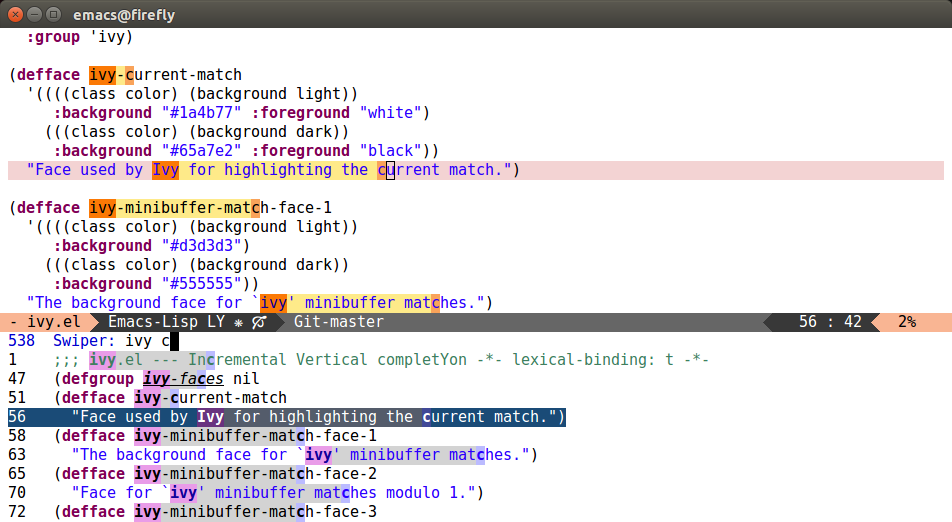[](https://travis-ci.org/abo-abo/swiper)
***flexible, simple tools for minibuffer completion in Emacs***
This repository contains:
**Ivy**, a generic completion mechanism for Emacs.
**Counsel**, a collection of Ivy-enhanced versions of common Emacs
commands.
**Swiper**, an Ivy-enhanced alternative to isearch.
# Ivy
[](https://melpa.org/#/ivy)
[](https://stable.melpa.org/#/ivy)
Ivy is a generic completion mechanism for Emacs. While it operates
similarly to other completion schemes such as `icomplete-mode`, Ivy
aims to be more efficient, smaller, simpler, and smoother to use yet
highly customizable.
To try Ivy, just call M-x `ivy-mode`. This will enable
generic Ivy completion, including specific completion for file and
buffer names.
### Installation
Install the `ivy` package from MELPA / GNU ELPA.
Users of Debian ≥10 (and derivatives such as Ubuntu ≥18.04) can
install Ivy, Counsel, and Swiper with `sudo apt install elpa-counsel`.
To add Hydra support `sudo apt install elpa-ivy-hydra`.
## Documentation
### Manual
The manual is available as [HTML](https://oremacs.com/swiper/).
After installing from MELPA, the manual is also available through the `(ivy)` Info node.
The source file for the Info page is
[here](https://github.com/abo-abo/swiper/blob/master/doc/ivy.org).
### Wiki
Ivy and Swiper wiki is here: [the wiki](https://github.com/abo-abo/swiper/wiki).
### Small config example
```elisp
(ivy-mode 1)
(setq ivy-use-virtual-buffers t)
(setq enable-recursive-minibuffers t)
;; enable this if you want `swiper' to use it
;; (setq search-default-mode #'char-fold-to-regexp)
(global-set-key "\C-s" 'swiper)
(global-set-key (kbd "C-c C-r") 'ivy-resume)
(global-set-key (kbd "") 'ivy-resume)
(global-set-key (kbd "M-x") 'counsel-M-x)
(global-set-key (kbd "C-x C-f") 'counsel-find-file)
(global-set-key (kbd " f") 'counsel-describe-function)
(global-set-key (kbd " v") 'counsel-describe-variable)
(global-set-key (kbd " o") 'counsel-describe-symbol)
(global-set-key (kbd " l") 'counsel-find-library)
(global-set-key (kbd " i") 'counsel-info-lookup-symbol)
(global-set-key (kbd " u") 'counsel-unicode-char)
(global-set-key (kbd "C-c g") 'counsel-git)
(global-set-key (kbd "C-c j") 'counsel-git-grep)
(global-set-key (kbd "C-c k") 'counsel-ag)
(global-set-key (kbd "C-x l") 'counsel-locate)
(global-set-key (kbd "C-S-o") 'counsel-rhythmbox)
(define-key minibuffer-local-map (kbd "C-r") 'counsel-minibuffer-history)
```
Note: parts of this config can be replaced by using `counsel-mode`.
# Counsel
[](https://melpa.org/#/counsel)
[](https://stable.melpa.org/#/counsel)
`ivy-mode` ensures that any Emacs command using
`completing-read-function` uses ivy for completion.
Counsel takes this further, providing versions of common Emacs
commands that are customised to make the best use of ivy. For example,
`counsel-find-file` has some additional keybindings. Pressing
DEL will move you to the parent directory.
Enabling `counsel-mode` remaps built-in Emacs functions that have
counsel replacements:
| Emacs command | Counsel equivalent |
|--------------------------|----------------------------|
| execute-extended-command | counsel-M-x |
| describe-bindings | counsel-descbinds |
| describe-function | counsel-describe-function |
| describe-variable | counsel-describe-variable |
| apropos-command | counsel-apropos |
| describe-face | counsel-describe-face |
| list-faces-display | counsel-faces |
| find-file | counsel-find-file |
| find-library | counsel-find-library |
| imenu | counsel-imenu |
| load-library | counsel-load-library |
| load-theme | counsel-load-theme |
| yank-pop | counsel-yank-pop |
| info-lookup-symbol | counsel-info-lookup-symbol |
| pop-to-mark-command | counsel-mark-ring |
| bookmark-jump | counsel-bookmark |
# Swiper
[](https://melpa.org/#/swiper)
[](https://stable.melpa.org/#/swiper)
Swiper is an alternative to isearch that uses ivy to show an overview
of all matches.

A helm version of swiper is also available:
[swiper-helm](https://github.com/abo-abo/swiper-helm).
## Screenshots

There's also a ten minute [video demo](https://www.youtube.com/watch?v=VvnJQpTFVDc).
# Frequently asked questions
Q: How do I enter an input that matches one of the candidates instead
of this candidate? Example: create a file `bar` when a file
`barricade` exists in the current directory.
A: Press C-M-j. Alternatively, you can make the prompt line selectable with `(setq ivy-use-selectable-prompt t)`.
# Contributing
Please see the [guidelines](https://github.com/abo-abo/swiper/blob/master/CONTRIBUTING.org) for reporting issues and opening pull requests.